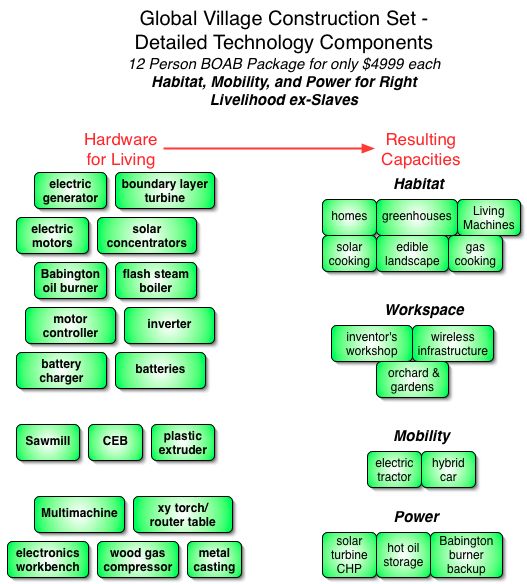Organizational Strategy: Difference between revisions
Jump to navigation
Jump to search
No edit summary |
No edit summary |
||
| Line 11: | Line 11: | ||
#Social technology of gathering 12 people | #Social technology of gathering 12 people | ||
#Land acquisition strategy built into the social technology. | #Land acquisition strategy built into the social technology. | ||
==Hardware for Living== | |||
The hardware for living includes: | The hardware for living includes: | ||
| Line 16: | Line 18: | ||
[[Image:OSE_RLC.jpg]] | [[Image:OSE_RLC.jpg]] | ||
==Social Technology== | |||
The social technology involves collecting a group of 12 skilled individuals | |||
*Agricultural Producer - orchard, greenhouse, nursery, forestry, animal husbandry, vermiculture, fertilizer production - to feed the community and provide products for market | |||
*Master Builder - an individual to lead construction efforts | |||
*Energy Provider - expert in renewable energy for autonomous energy, sales to the grid, excess fuel sales | |||
*IT Provider - manages the computer and connectivity infrastructure | |||
*Electronics Person - familiarity with computer control, automation, sensing, device controls, electronic devices, etc. | |||
*Inventors - interesting products that contribute to a better world, not making a living; products include vehicles, energy systems, machines, and other devices; large market opportunities via open source flexible production, starting with power, habitat, mobility, and food needs of local communities | |||
Priorities: | Priorities: | ||
Revision as of 02:26, 24 September 2007
Introduction
Deployment of on-demand replicable right livelihood communities happens in 3 Phases:
- Pioneering life with deep exploration of useful technologies, to distill the essential from chaff. Status - in progress
- Replication as a 12 person, Buy Out At the Bottom (BOAB) Right Livelihood enterprise community (RLEC), where our notion of right livelihood includes priciples of open source economic development. This is an extension of the Hexayurt concept from the scale of emergency self-sustaining shelter to the scale of a landed, autonomous, small community with a sound economic base as part of the package. See details of the BOAB RLEC below.
- Internships at tha RLEC designed for immersion study to train others to replicate RLECs as a novel form of social organization.
Technology Base
Prerequisite technology for Phase 2 involves
- Necessary hardware for living - energy, food, housing, mobility, internet, workshop, orchard, etc.
- Social technology of gathering 12 people
- Land acquisition strategy built into the social technology.
Hardware for Living
The hardware for living includes:
Social Technology
The social technology involves collecting a group of 12 skilled individuals
- Agricultural Producer - orchard, greenhouse, nursery, forestry, animal husbandry, vermiculture, fertilizer production - to feed the community and provide products for market
- Master Builder - an individual to lead construction efforts
- Energy Provider - expert in renewable energy for autonomous energy, sales to the grid, excess fuel sales
- IT Provider - manages the computer and connectivity infrastructure
- Electronics Person - familiarity with computer control, automation, sensing, device controls, electronic devices, etc.
- Inventors - interesting products that contribute to a better world, not making a living; products include vehicles, energy systems, machines, and other devices; large market opportunities via open source flexible production, starting with power, habitat, mobility, and food needs of local communities
Priorities:
- Open Source Solar turbine, potential components
- Babington burner - http://www.green-trust.org/2000/biofuel/babington/default.htm
- Flash boiler -
- Solar concentrators - similar to http://www.redrok.com/images/hdsolar.jpg but mounted on flat panels for simplicity; check pricing estimates from http://www.hdsolar.com/ and compare to $100/KW thermal capture predictions by OSE
- Boundary Layer Turbine - http://openfarmtech.org/index.php?title=Solar_Turbine_CHP_System#Component_Design_-_Boundary_Layer_Turbine_.28BLT.29
- Generator heads - not much available, but check out http://www.scoraigwind.com/axialplans/index.htm
Outcomes:
- commercial product via open source, distributed, flexible fabrication, at absolute lowest cost, $1/W
Means:
- fabrication optimization, and product in kit for user assembly
Other priorities:
- CEB
- Sawmill
- Multimachine - http://opensourcemachine.org/
- CNC control
- Electric motor
